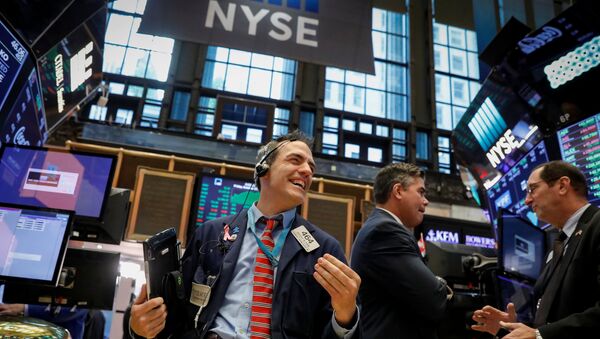Kristian Rouz – Stunning gains in the US stock market in the recent months have greatly outpaced Main Street economic expansion, exacerbating concerns about the widening discrepancies between the financial and non-financial sectors of the economy. However, this week’s visit to mainland China by President Trump might have eased most of these concerns.
Aside from striking $250 bln in commercial deals and reaching a hint at mutual understanding regarding the narrowing of the US trade deficit with mainland China, the meetings between Presidents Trump and Xi have produced another development – perhaps, the most important one – China’s move to open up its financial sector to foreign investment.
READ MORE: Analysts Explain How China May Respond to US Push to Militarize Asia-Pacific
On Thursday, mainland China lifted foreign ownership restrictions on its banks and other financial institutions. The move went into effect the same day.
Previously, China’s regulators only allowed 49-percent foreign ownership in its financials, but, under the new policy, foreign enterprises will be able to own 51-percent in securities funds and joint ventures.
Implementation, however, will be gradual, as the shift to the new policy will be happening over the course of next three years.
“At the end of the day, China favors Chinese entities,” Steve Rattner of Willett Advisors says. “So yes, you can own 51 percent of a bank now, but how much business are you going to do, who are you going to do it with?”
Among the US companies to benefit the most from China’s new approach, is Morgan Stanley – which earlier this year increased its stake in partnerships with Huaxin Securities to 49 percent from 33 percent. By increasing its stake further, to 51 percent, Morgan Stanley will de-facto be able to conduct its Mainland China operation on its own.
Goldman Sachs and Citigroup are reportedly seeking to assume control over their joint ventures in Mainland China as well.
“Morgan Stanley is committed to growing our businesses in China,” the bank’s official statement reads. “We see this policy change as an important step in the further development and opening-up of China’s capital markets.”
This paves the way for a massive influx of financial sector investment into mainland China – mainly, from the overheated US stock market. As of Friday, Dow Jones’ year-to-date expansion stood at 18.52 percent, whilst S&P 500 rose by 15.34 percent year-to-date – mainly, due to the Trump administration’s deregulation policies, and the partial lifting of the strangulating Dodd-Frank restrictions.
READ MORE: US Strikes China With 'Double-Edged Sword' in Aluminum Foil Dumping Dispute
These gains in the US stock market have, however, failed to translate into substantially quicker GDP growth at home, as financial sector enterprises have preferred to invest and reinvest into the booming financial sector, with only a fraction of the returns going to the skyrocketing real estate market.
The US economy grew at an average of roughly 2.5 percent this year so far, driven by the more modest expansion in manufacturing, exports, and retail.
Mainland China’s opening up of its financial sector will allow it to stave off the bubble concerns in the US financial sector, diverting excessive capital to overseas investment. Even though a better scenario would be reinvesting financial sector gains in the real economy at home, at least eliminating the discrepancies between Main Street and Wall Street expansion in the US would constitute moderate success.
Wall Street growth is thus poised to slow in the medium-term, rendering the broader US economy more sustainable. However, this also poses a threat of disinvestment in the US, as China’s huge financial services market promises quite hefty returns compared to the Appalachia coalmines.




